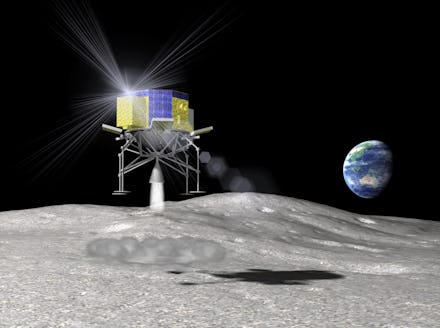First Private Moon Launch Scheduled for 2017

On Wednesday, Israeli non-profit organization SpaceIL obtained a private contract to pilot a space rover on the moon. The launch contract earns SpaceIL a "ticket to the moon" aboard a SpaceX Falcon 9 launcher, and is the first-ever verified launch deal awarded to a private firm. As such, serves as the starting gun for an independent space race. The contract also clears the way for Israel's maiden rover moon landing, expected in 2017 — provided everything goes according to plan.
"Space and space exploration are the next frontier," writes SpaceIL in its mission statement. "The space industry has produced satellite TV, water filters, UV sunglasses and many more inventions. SpaceIL's success will be a source of pride for Israel while introducing the world to new and innovative ways to explore outer space." The organization added that Israel's nascent space industry could be a "major growth engine" for the country's economy.
Check out some renderings of the private mission shared on Twitter.
SpaceIL is a surprisingly young organization to be planning an ambitions lunar landing. Three Israeli engineers founded the nonprofit in 2010 in response to the Google Lunar X Prize challenge, a race to the moon with a $20 million trophy. In order to win the competition, participants need to achieve an unmanned lunar landing, traverse a distance of 500 meters on, above or below the moon's surface and return high-definition photos and video footage to earth.
"Aside from landing on the moon, SpaceIL's collective vision is to create a new 'Apollo effect' to inspire the next generation in Israel and around the world to think differently about science, engineering, technology and math," write SpaceIL's founders in their mission statement. "Despite its technological excellence, Israel faces a severe need for more scientists and engineers."
Should SpaceIL win Google's competition, the company says it will use the funds to promote science education in Israel through specialized curriculum, videos and online resources.
The last lunar landing happened on Dec. 14, 2013, when China sent an unmanned probe to the moon. At the time, Chang'e 3, China's rover, was the first probe to land successfully on the moon's surface in nearly four decades and ended a 37-year-long dry spell for craft landings on the moon. Shortly thereafter, scientists in the United States began pressuring Congress to invest in another moon mission; however, that goal has yet to be realized.